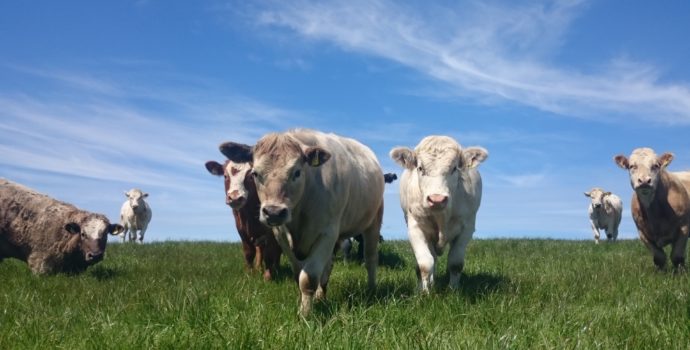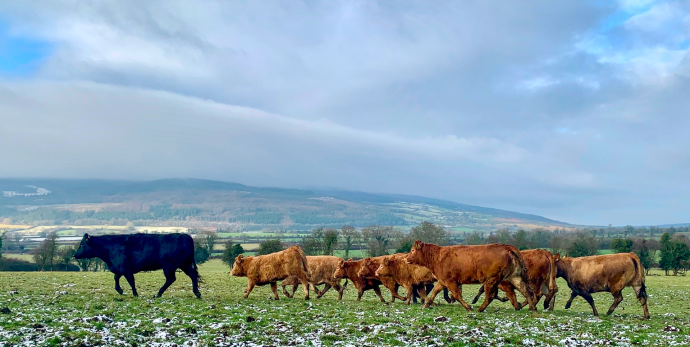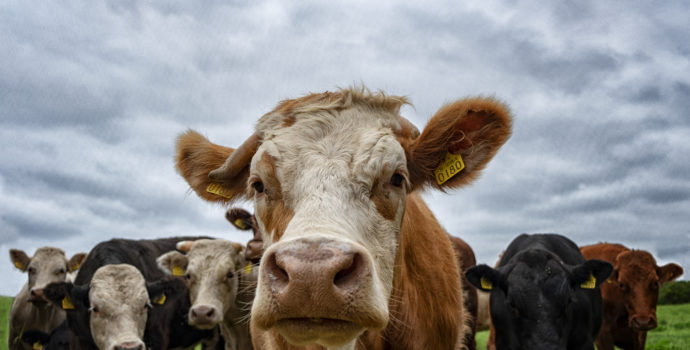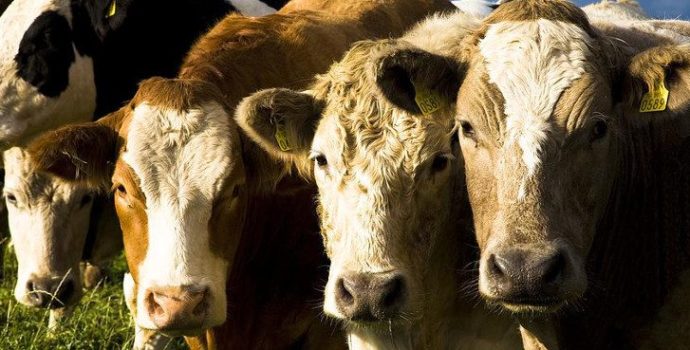Livestock Council Report November 2023
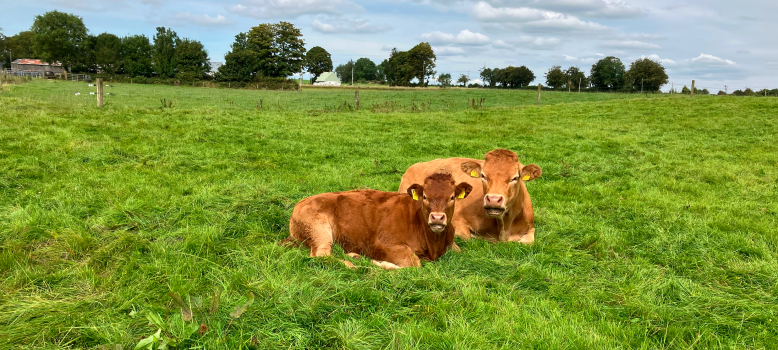
1. Market Report
Market Report
- Beef Price: Steers are making from €4.60 to €4.75/kg. Heifers are making €4.65/kg to €4.80/kg with higher deals for larger lots and increased off season breed bonuses paid. Young Bulls are ranging from €4.80 to €5.00/kg for R/U grades. Cows are making €3.70 to €4.50/kg.
- DAFM Reported Prices week ending 29/10//2023: R3 steer prices for the latest week decreased by 1c/kg to €4.80/kg, R3 heifer price remains steady at €4.87/kg. R3 young bull prices increased by 2c/kg to €4.75/kg. O3 grading cows are back 3c/kg to €3.95/kg, R3 grading cows are back 3c/kg to €4.28/kg.
Composite prices: The latest Irish prime composite cattle price and the prime Export Benchmark on October 21st, 2023 were equivalent to €4.52kg and €4.84/kg deadweight respectfully.
GB Cattle Prices as reported by AHDB: Prices in GB for R3 steers decreased by 2.4p/kg in the latest week bringing the price to £4.88/kg. R3 Heifers decreased by 2.9p/kg to £4.86/kg for week ending October 28th 2023.
Supply Figures as Reported by DAFM – Week 43 (29.10.2023)
- Supplies: Supply forecasts to the year-end suggests that overall throughput for 2023 is likely to show a decline of 50,000-60.000 head on last year. The inflationary impact on consumption has moderated demand for cattle with the average EU cattle price falling by 36 cent (7%) to €4.84/kg since January. With the weaker market conditions, Irish beef exports to the EU to the end of June decreased by 2.1% to €724 million and volume fell by 5% to 123,000 tonnes.
- Market Conditions: Irish beef exports for the first seven months of the year have increased in value by 1.1% to €1.49 billion, with export volumes down 3.4% to 272,000 tonnes. The UK has been the standout market for Irish beef in 2023, with exports growing by 11.6% in value and 5.6% in volume terms to 113,000 tonnes.
- Live Exports: To date a total of 279,657 live cattle have been exported out of Ireland which represents a 15% increase from the same period in 2022. Calf exports have been particularly strong increasing 22% or 36,082 head from the same period in 2022. Tightening cattle numbers across Europe has contributed to a steady demand for Irish cattle during 2023 with very positive feedback from customers on the quality, health status and performance of Irish animals when they reach their destination.
2. Budget 2024
- The Minister has committed to a payment of €200/suckler cow for 2023 and 2024.
- €20m in funding has been allocated for a new suckler cow scheme to run alongside the SCEP in 2024.
- €6.5m in funding has been allocated for a new dairy beef scheme for 2024.
- IFA continue to pursue €300/suckler cow payment and a minimum payment of €100 cattle rearing and finishing scheme and €100 calf rearing scheme.
3. Activity since last National Council
- Livestock committee convened in July and October.
- Livestock Management committee convened in July.
- IFA held a series of SCEP information meetings in Mayo, Galway, and Clare.
- Attended the Meat Market Observatory export group online in June.
- Attended the Bord Bia Meat & Livestock meeting in June.
- Attended the Calf stakeholders group meeting in June and October.
- Attended the Food Vision Beef & Sheep Group meeting in June.
- Attended the Copa Working Party meeting on Breeding Livestock in July.
- IFA Livestock Management committee met with Meat industry Ireland in July.
- Met the Dept of Agriculture on the National Beef Welfare scheme in August.
- Attended the Copa and Cogeca Working Party meeting on Beef and Veal in September.
- Attended the ICBF board meeting in September.
- Attended the Beef and Veal Civil Dialogue Group meeting in Brussels in October.
- Attended the Bord Bia TAC meeting on October.
- Attended the ICBF Board meeting in October
- Weekly publication of IFA cattle price updates.
3. Upcoming issues- Upcoming events
Suckler Carbon Efficiency Programme
- A funding allocation of €52m was provided for the SCEP scheme in 2023 with a payment of €150 per suckler cow available on the first 22 cows and €120/cow on the remainder.
- 17,637 farmers are currently participating in the scheme with an average reference number of 25 cows. There are currently 441,346 cows eligible for payment.
- A further 1,510 herds are awaiting Bord Bia QA approval for the scheme and have until January 22nd January 2024 to be certified.
National Beef Welfare Scheme
- A funding allocation of €28m was provided for the National Beef Welfare scheme in 2023 with a maximum payment of €50 per suckler cow.
- 16,424 farmers have applied to participate in the scheme. The average reference number per herd is 21 calves with a total of 347,607 calves eligible for payment.
- IFA strongly rejected the inclusion of the IBR testing measure and requested an amendment to include practical measures that avoid leakage of monies to service providers.
Food Vision Beef Group
- IFA attended the latest Food Vision Beef Group meeting in June.
- IFA made a joint Beef and Dairy submission to the Food Vision process based on providing long term economic viability for the suckler and beef sector while addressing the concerns around dairy beef calf welfare and rearing viability.
- The following key points put forward included;
- The Dairy Beef Welfare Scheme provides incentives for farmers to rear calves from the dairy herd. The scheme must be enhanced, and the level of supports increased to reflect the costs, labour and standards required.
- Direct supports for suckler farmers must be increased to €300/cow to provide economic viability in the sector in order to ensure suckler farming is equipped to positively contribute to our climate target ambitions and continue to drive the socioeconomic, environmental and biodiversity sustainability of rural Ireland.
- Farmers feeding animals for the second year of beef production will be required to play a pivotal role in achieving the climate target ambition for the sector. Farmers rearing and finishing weanling and store cattle born in suckler and dairy herds must be directly supported for this phase of the process with a minimum of €100/animal to support measures that maximise the performance of these animals.
- Young Bull finishers have the potential to positively impact on the average age of slaughter of all prime cattle and must be supported in this high-cost specialist production system to maximise performance and viability of this livestock production system.
Climate Target Supports- New Funding
- The measures outlined to the Beef Food Vision Group for the sector to achieve emission reduction targets are not new.
- The level of ambition for the sector in implementing some of these measures will be directly correlated to the level of funding ambition from Government for beef and suckler farmers to support these changes and new practices on farm.
- Government must come clean with suckler and beef farmers on the levels of funding they are prepared to provide to support adaption of the new measures.
Electronic Payments from factories
- IFA have met MII and meat processing plants and demanded that EFT be provided as an option of payment to all beef farmers.
National Genotype Programme
- Funding for 800,000 genotype samples has been provided to the programme in year 1, with €23m of BAR funding allocated to the scheme. 200,000 of these are allocated to suckler herds. IFA has sought an alignment between the SCEP and the proposed National Genotyping programme both in terms of requirements and genotype costs to farmers.
On-going events
- €300 Suckler cow payment, €100 rearing and finishing payment.
- Livestock committee meeting scheduled for December.
- On-going contact with DAFM regarding suckler schemes.
- Weekly publication of IFA beef price updates.
- On-going contact with Bord Bia and MII


